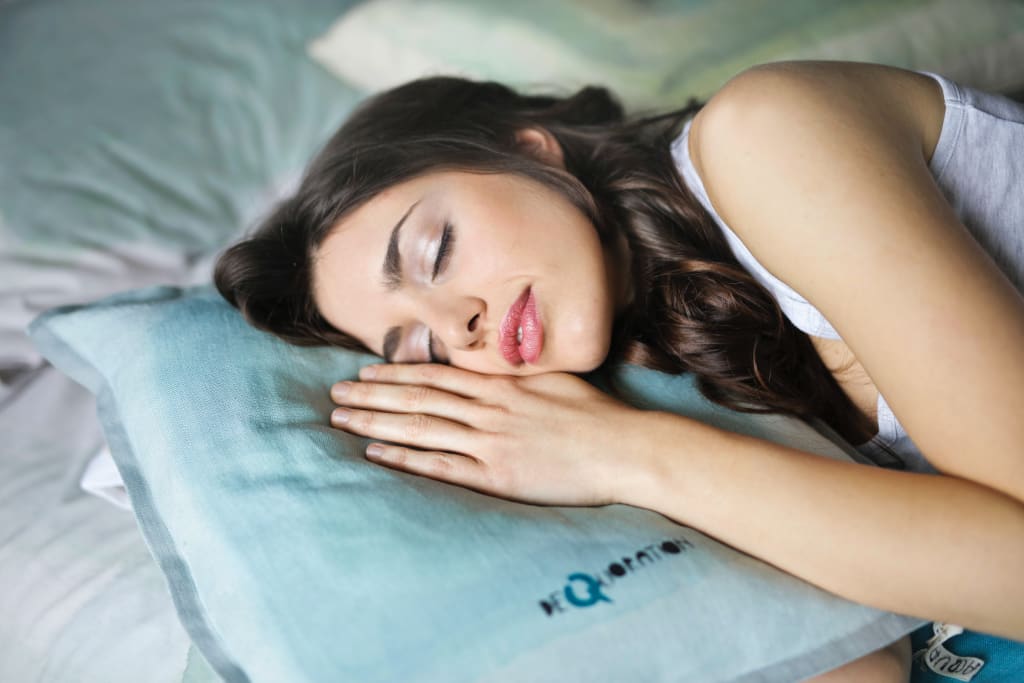5 Ways to Improve Your Sleep What You May Not Know
"Sleep is a big part of your health. Did you know that people who get enough sleep have less chance of heart disease and stroke? They also tend to weigh less, have lower blood pressure, and better blood sugar control than people who don't get enough sleep."

Sleep is a big part of your health. Did you know that people who get enough sleep have less chance of heart disease and stroke? They also tend to weigh less, have lower blood pressure, and better blood sugar control than people who don't get enough sleep.
Try to go to bed at the same time each night. Try to wake up at the same time each morning.
When it comes to sleep, consistency is key. You will find that trying to go to bed at the same time each night and waking up at the same time each morning will help you get into a nightly routine that works for you. See if your body can adjust to this new schedule and stick with it for a few weeks before making any changes. This way, you'll be able to determine if it's something that makes sense for your lifestyle or not.
If your body still isn't adjusting after several weeks have passed, try making minor adjustments to see how they affect things like falling asleep more easily or feeling more rested in the morning when waking up on time without an alarm clock (if possible).
Avoid caffeine, alcohol, and nicotine before bedtime.
Avoiding caffeine and alcohol may seem like a no-brainer, but even if you're not drinking coffee or wine at night, there are other ways to consume these substances. Caffeine is also commonly found in chocolate and tea, while alcohol can be found in some mouthwashes and cough syrups. Nicotine can negatively affect your ability to fall asleep, so if you smoke cigarettes or chew tobacco, it's best to quit the habit altogether.
Caffeine stimulates the body and makes us feel more awake - and unfortunately for those of us who crave a good night's sleep before school or work tomorrow morning (or both), this means that we have less chance of falling asleep quickly when we use it within six hours before bedtime. Studies show that people who drink caffeinated beverages at least three hours prior to going to sleep tend not only doze off faster than those who drink them closer into their bedtime but also spend longer periods asleep overall - no doubt why many people choose decaf drinks over regular ones when they need help falling asleep!
Get help if you snore or have sleep apnea.
If you snore loudly and often, it could be a sign that you have sleep apnea. Sleep apnea is a condition where the airway is blocked during sleep, rendering you unable to breathe for short periods of time. It can cause serious health problems - including high blood pressure, heart disease and stroke.
You may not realize that you have sleep apnea until your partner points it out or your doctor diagnoses it during an examination. Sometimes it takes a while before this happens because symptoms vary from person to person; many people with mild cases of the disorder don't even know they have it since their bodies wake up when the blocked airway prevents them from getting enough oxygen and alerts them so they can resume breathing again without waking up at night.
If this sounds like what's going on in your life (and if so: congratulations), don't despair! Treating sleep apnea requires wearing a mask over your nose while sleeping that helps keep your airway open - but there are also other options available if wearing one isn't ideal for whatever reason (for example: claustrophobia).
Don't watch TV or use a computer before going to bed.
One of the worst things you can do before bed is to watch television or use a computer. This may sound counterintuitive, but it's true: both devices are very bright and emit light in different wavelengths that can actually disrupt your sleep cycles.
The most commonly used device to replace TV and computers is the e-reader. The light from these devices is not as harsh on your eyes, and they also don't have any moving images (or any other source of eye strain). You could also try playing some calming music on your phone or tablet if you have one - that way you won't have to worry about falling asleep with a lit screen in front of you!
Sleep in a dark room. Keep your bedroom quiet or use a white noise machine for sound.
Sleeping in a dark environment is one of the best ways to get a good night's sleep. White noise machines can help you with this process by producing sounds that are similar to those that you hear when listening to the waves of the ocean or crickets chirping. The repetitive sound will calm your mind and body down before bedtime, so that it's easier for you to fall asleep. You can also try using earplugs if it's too loud outside; this will block out unwanted noise and help make sure you're getting enough rest during the day as well as at night!
Don't use your phone in bed and avoid a TV in the bedroom.
- Don't use your phone in bed and avoid a TV in the bedroom.
- If you have to use your phone or laptop before going to sleep, then put it on airplane mode. This will stop the constant notifications from popping up on screen, which is one of the main reasons we get distracted when trying to fall asleep!
- Avoid eating right before going to bed. The last thing your body needs is food if it's meant to be resting!
Exercise daily but not too close to bedtime.
Exercising daily is an important part of a healthy lifestyle.
Exercise helps reduce stress, which can improve your sleep quality.
You can benefit from exercise at any time of day, but it's best to avoid exercising less than four hours before bedtime. You may have trouble falling asleep if you exercise too close to bedtime because your body temperature rises during exercise and remains elevated for a few hours afterward.
If you're new to exercising, start with a gentle form of activity that requires very little exertion. As you become more fit, gradually increase the intensity and duration of your workouts until they are challenging enough for you (but not so intense that they disrupt your sleep).
Naps can help if they're short and during the early afternoon (before 3pm).
Naps can be a great way to recharge your batteries, stay alert and focused, and help get through the day. Naps can also help you stay healthy and get more done.
So when is the best time of day to take a nap? Well, it depends on what function your nap serves. If you're trying to improve your quality of sleep at night (which is helpful for getting good rest), then taking an early afternoon or late evening nap isn't going to work for you - it'll actually interfere with your nighttime sleep. On the other hand, if naps are something that helps keep your energy levels up during the day or gives you some time off from work so that focus on another project becomes easier later in the afternoon (or even into evening), then this might be a good strategy for gaining some benefits from napping without any negative effects on nighttime restorative sleep
You can stay on track with your health goals by sleeping well!
Now, I know what you're thinking. How is sleep important?
Well, sleep is an essential part of good health. The amount of time we spend sleeping affects our mood, energy level and physical appearance. In fact, studies have shown that people who get enough sleep are more likely to lose weight than those who don't get enough rest; they also tend to be more productive at work because they can concentrate longer without feeling tired or irritable!
Conclusion
We hope you enjoyed this article and take away some practical tips to improve your sleep. We know how difficult it can be to get a good night's rest, but with the right tools and mindset, you can make strides towards a more restful sleep. Good luck!
About the Creator
Courtanae Heslop
Courtanae Heslop is a multi-genre writer and business owner.






Comments
There are no comments for this story
Be the first to respond and start the conversation.